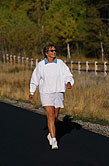- Check Your Fridge for Trader Joe’s Fresh Basil, Linked to Salmonella
- Rising Number of Americans Sent to ERs Last Year During Heat Waves
- Big Health Care Disparities Persist Across the U.S., New Report Finds
- Teens Often Bullied Online About Their Weight: Study
- Work That Challenges Your Brain Helps You Stay Sharp With Age
- Urine Test Might Spot Head-and-Neck Cancers Early
- Many Seniors Are Overmedicated, But ChatGPT Might Prevent That
- Antipsychotics May Do Great Harm to People With Dementia: Report
- Two-Drug Combo Curbs Drinking for People Battling Severe Alcoholism
- Most Homeless Americans Are Battling Mental Illness
Exercise May Make Life Better for Those With Arthritis


SATURDAY, Oct. 26Regular exercise boosts quality of life and reduces health care costs for people with arthritis, a new study shows.
Researchers found that meeting national physical activity guidelines could add up to 20 days of good health in one year for these patients.
However, many Americans are not getting the recommended 150 minutes of moderate to vigorous activity a week, in bouts lasting at least 10 minutes each.
The findings were scheduled to be presented this week at the American College of Rheumatology annual meeting in San Diego.
“Regular physical activity improves health and reduces mortality in the general population. Furthermore, physical activity promotes arthritis-specific health benefits including improving symptoms, function and psychosocial outcomes, as well as reduced disability,” study author Dr. Kai Sun, a medical resident and research trainee at Northwestern Feinberg School of Medicine in Chicago, said in a news release from the American College of Rheumatology.
“Despite these benefits,” Sun noted, “the majority of adults in the U.S. do not attain the recommended amounts of physical activity.”
One type of arthritis — osteoarthritis — which is most common among middle-aged or older adults, causes progressive damage to the cartilage, or cushioning at the end of long bones. This damage can lead to pain, swelling or limited movements around the joint.
Knee osteoarthritis is one form of the joint disease that may be worsened by excess weight. A person’s age, certain injuries, stress on the joints and having a family history of the condition also increase people’s risk for osteoarthritis.
Using results from a nationwide study sponsored by the U.S. National Institutes of Health, a team of researchers examined physical activity levels and the quality-adjusted life years (a standard measurement of quality of life and cost-effectiveness of medical treatment) of 4,700 adults diagnosed with or at risk for arthritis of the knee.
The researchers measured the physical activity levels of the participants for one week using a device called an accelerometer. They then divided the participants into three groups: One group included those who were meeting national physical activity guidelines; the second group included participants who were not active enough, but did engage in some moderate to vigorous activity; and the third group included those who were inactive.
The researchers measured the participants’ physical activity level and quality-adjusted life years when the study began, and again two years later.
Over the course of the study period, the quality-adjusted life years of participants who met the guidelines for physical activity were higher than those who were somewhat active or inactive, the investigators found.
The difference translated into between 10 and 20 more days of good health in one year. The researchers noted that even if the national guidelines are not met, increasing physical activity in any way could enhance quality of life, add years of health and lower overall health care costs for people with arthritis.
Research presented at meetings should be viewed as preliminary until published in a peer-reviewed medical journal.
More information
The U.S. National Institute of Arthritis and Musculoskeletal and Skin Diseases has more about osteoarthritis.
Source: HealthDay
Copyright © 2024 HealthDay. All rights reserved.










